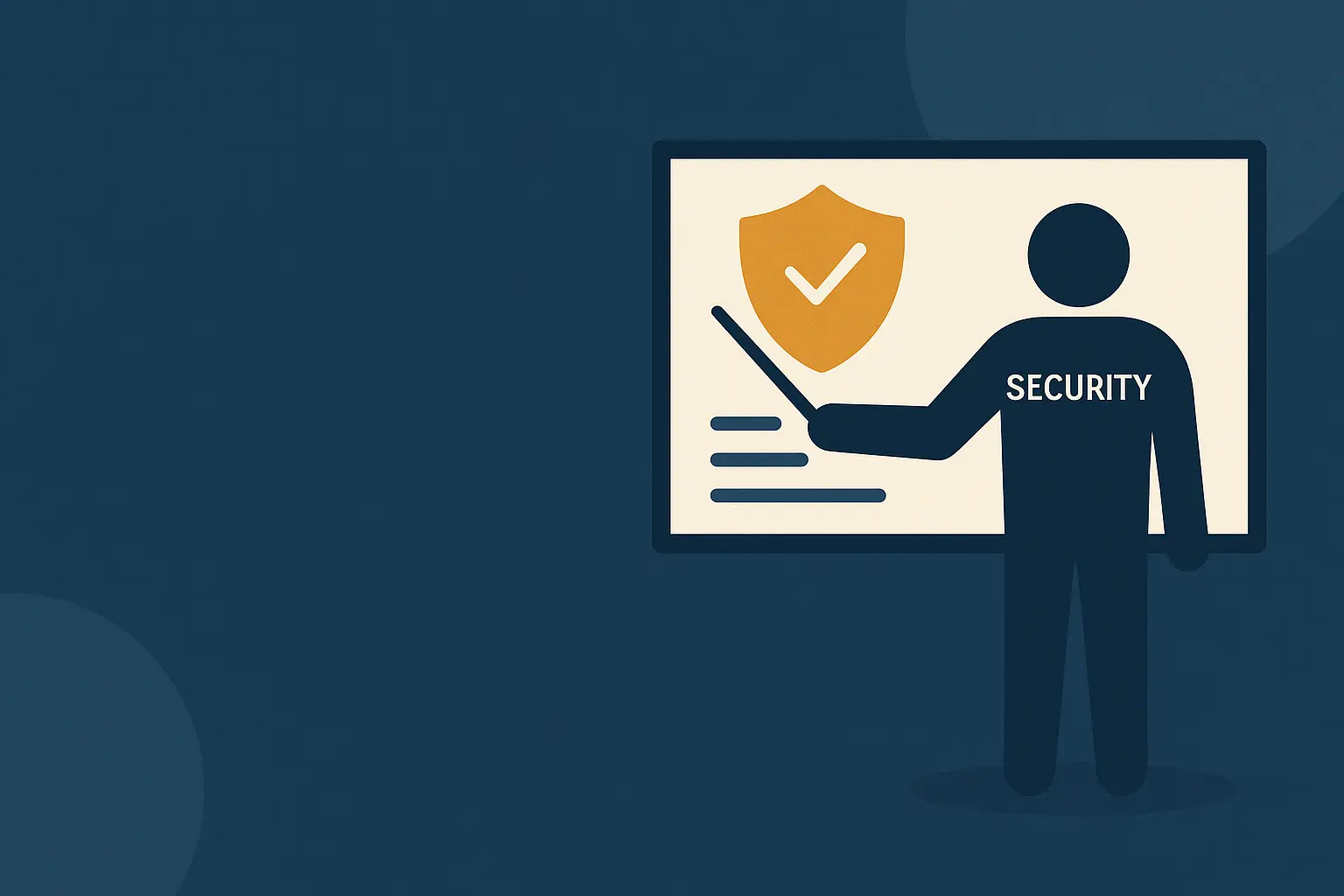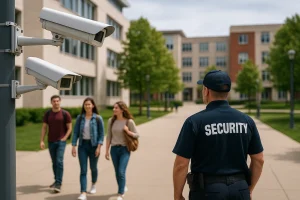How To Build A Successful Security Guard Training Program
Prevent costly mistakes and liability with a structured security guard training program. Learn how to set role-specific outcomes, choose the right training formats, and keep certifications organized for maximum compliance and client trust.
By Catherine Shannon
August 7, 2025

Could these mistakes happen at your security company?
A burglary occurs in a gated community that your company services- a homeowner was injured before the intruder escaped. During the followup investigation, it’s discovered that your security guards’ entry logs were incomplete- vehicle license plates of those entering, along with proper ID checks for residents and visitors- were often skipped. Now your security company is being held liable for damages and medical costs from the break-in.
Your security guard at a retail plaza sees a teen sitting on the curb outside a closed store, scrolling on his phone. Instead of calmly going over and asking the teen to move along in a non-confrontational way, your guard grabs him by the arm and physically tries to remove him. The resulting scuffle is captured on a bystander’s phone and posted online. You lose your contract with the property manager when people complain- and your guard is facing possible assault charges.
👎🏻Inconsistent access control
👎🏻Inaccurate record-keeping
👎🏻Overreaction due to lack of training
These mistakes were preventable- the direct result of inadequate security guard training.
This guide is designed for security companies, facility managers, or HR professionals that want to avoid such easily preventable mistakes by their company’s personnel. Read on if you need help with creating a structured effective security guard training program for your security guards.
HOW TO TRAIN SECURITY GUARDS
The main step in developing a training program is to identify your intended role-specific outcomes. Any training program should customize exactly what you want your guards to be able to do when fully trained.
Here are three clear examples of role-specific outcomes- and the necessary training for them- for a mall security guard, a hospital security guard, and a bodyguard. Use these comparisons to help define the specific roles and training needs within your own security company:
1. (Public-facing/preventative) ROLE SPECIFIC OUTCOMES for a mall security guard would be to:
Prevent theft/vandalism by monitoring high traffic areas and entrances
- Respond to emergencies like medical, fire or evacuations, with law and EMT
- Remain approachable and professional in interactions with customers and public
- Enforce mall rules and conduct
- Respond calmly to minor conflicts among shoppers or staff
- Write accurate incident reports if rules are violated
- Conduct regular foot or vehicle patrols of interior and exterior of property
- Observe for hazards like spills or broken equipment
- Monitor CCTV
- Report suspicious or criminal activities
Therefore SPECIALIZED TRAINING for a mall security guard would include:
- Conflict de-escalation techniques (e.g. NCI nonviolent crisis intervention by providers such as Crisis Prevention Institute, or Verbal Judo Institute)
- Situational awareness
- Radio communication skills
- CCTV operator training
- Emergency response training/first aid
- Surveillance protocols
- Customer service/public interaction etiquette
- Instruction in incident report writing, daily activity reports, legal considerations
- Use of technology for digital reports, uploading and storage of reports
2. (Public-facing, sensitive, high-stress environment) ROLE SPECIFIC OUTCOMES for a hospital security guard would be to:
Manage emotional situations involving patients, family, possible psychotic or intoxicated people
- De-escalate aggressive behavior
- (If armed) Firearm use in highly specified situations, emphasis on restraint, liability awareness
- Control access to restricted areas
- Assist with patient restraint or transport
- Handle medical privacy adhering to HIPAA rules
- Aid law enforcement or EMS personnel
- Remain calm in stressful situations
Therefore SPECIALIZED TRAINING for a hospital security guard would include:
- Conflict de-escalation techniques in medical settings (e.g. by IAHSS International Association for Healthcare Security & Safety)
- Use of force in medical settings/least restrictive means (courses from MOAB Management Of Aggressive Behavior with healthcare specific tracks, or classes in Verbal Judo or CPI Crisis Prevention Intervention)
- HIPAA and Patient Privacy Law instruction (providers like OSHA, MyHIPPAA Training)
- Infection control and biohazard awareness (biohazard symbols, risk zones, PPE personal protective equipment basics)
- HAZMAT awareness courses
- Situational awareness
- Radio communication skills
- CCTV operator training
- Incident report writing, daily activity reports, legal considerations
- Technology skills for digital reports
- Emergency response training/first aid
- Understanding hospital codes
- Surveillance protocols
- (If armed) State-mandated certification, close quarters training, use of force and legal liabilities in healthcare settings
3. (Personalized, high-risk) ROLE SPECIFIC OUTCOMES for a VIP protection bodyguard would be to:
- Give high level protection services to VIPs such as politicians, celebrities, executives
- Conduct threat assessment and risk management
- Provide close personal protection with defensive weapons, proper training, knowledge of regional legalities
- Ensure safe transportation of VIP and parcels (also vehicle maintenance/repairs, VIP convoy setup)
- Manage event security through access control, crowd management, safety during public or private events
- Handle highly sensitive personal and professional information
- Undertake special duties (answering phone calls, replying to emails, running errands)
- Understand digital threats beyond physical security (e.g. cyber attacks, privacy invasions, reputational damages)
- Do report writing (e.g. after-action reports AARs, daily logs, client briefings, threat assessments)
- Use radio communication to coordinate motorcade movement, crowd changes, backup calls
- Review surveillance footage, request live feeds, use surveillance units during events, utilize drones, CCTV feeds, facial recognition alerts
Therefore SPECIALIZED TRAINING for an EP executive protection bodyguard would include:
- Close protection tactics (e.g. from ESI Executive Security International, SIG Sauer Academy with firearm focus for EPs)
- Defensive and evasive driving (e.g. high speed maneuvers, escape routes, escort formation- from tactical schools such as VDI Vehicle Dynamics Institute)
- Threat assessment (e.g. securing locations ahead of VIP arrival, cover-and-evacuate drills if attacked)
- Protective intelligence (identifying risks before they escalate)
- OSINT open-source intelligence gathering classes (e.g. from SANS or Michael Bazzell online classes)
- Firearms and Tactical weapons training
- Unarmed combat and control techniques (e.g. Krav Maga as used by the Israeli military, or other close-combat systems)
- Travel/venue security planning, K&R kidnap and ransom training
- Medical & tactical emergency response (TECC Tactical Emergency Casualty Care, CPR, AED, tram first aid including gunshot wounds
- Cyber security awareness of communication encryption basics to prevent digital tracking
- Training in surveillance techniques, live feeds, CCTV and drone use
- Radio skills
- Effective communication with daily logs, threat assessments, AARs after action reports
DECIDING YOUR FORMATS ON HOW TO TRAIN SECURITY GUARDS
After identifying your role specific outcomes and the related specialized training, your security guard training curriculum can then be built. You can use a mix of in-house instruction, certified external courses, and outside expert instructors, presented in training formats like in-person, online, and scenario-based drills.
These are the 3 factors that will dictate training formats:
1. Regulatory requirements (e.g. guard cards, firearms, CPR, use of force)- These must be done by licensed instructors or third-party schools. For instance, in CA, guard card training is necessary to get a state security guard license. Candidates have to complete an 8-hour “Power to Arrest” and WMD Weapons of Mass Destruction training, done by a BSIS-certified training facility/instructor. Also in CA, instruction from a BSIS Bureau of Security and Investigative Services-certified facility is necessary for a guard to obtain firearm permits/exposed carry, baton, or pepper spray permits.
2. In-house expertise- This can be done for company-specific training, such as company reporting systems, internal software use, customer service protocols and other specific company standards. Initial onboarding is your internal orientation process for new hires joining your team. Later in-house training continues with ongoing refresher training for your personnel.
With in-house expertise, you will present your company SOP:
- Mission and expectations
- Dress code, behavior standards
- Use of force policy
- Communication protocols (radio codes, chain of command during incidents)
- Report writing specifics (paper logs, or software such as Guardtek or Silvertrac)
- Client preferences or rules about restricted areas, VIP protocols, parking, quiet zones
- Contact list of company supervisors, on-site contacts, local police/fire
- Post orders/digital post orders through apps like Silvertrac or Trackforce (shift hours, reporting structure, patrol duties, access control procedures)
3. Outsourcing experts for certified courses and expert-led training would be best for:
- Specialized or tactical skills
- Executive protection
- Krav Maga or other defense training
- OSINT intelligence
- Evasive driving
Though outsourced training can be more expensive than in-house training, it can give your company a competitive advantage and improve client retention, as well as reduce liability. High-end clients like VIPs, financial institutions, or hospitals may especially expect external certifications. Such high-value training and certificates can be used to boost your company’s online presence through skillful SEO usage on your website or Google My Business profile.
But what happens if you design your very best security officer training program- only to face issues like these?
- Disorganized training records for each of your guards
- Supervisors who don’t know when their guards’ credentials expire
- No immediate documentation available for audits or compliance checks
- Inability to show your clients proof of credentials (like background clearance, HIPAA, CPR, first aid, or conflict de-escalation credentials)
Even the strongest training program can fall short without organization, accountability and reliable tracking. And that is where The City Guards can help you with customized security guard company software. The City Guards is a trusted online resource in the security industry, and we have specialized security software designed for security companies. Our software will help you structure all your administrative tasks with:
✅ Reminder alerts and certification tracking
✅ Compliance help with regulatory re-qualification requirements
✅ Custom training paths by site, role or client
✅ Record keeping for audits
✅ Digital incident reporting
✅ Proof of guard qualifications for clients
And much more administrative help…
CONTACT THE CITY GUARDS TODAY– turn your successful security guard training program into the powerful key driver of your long-term business growth. We’ll design the right software tools for you.
For reliable customized help, call The City Guards.
Related Posts
Safety
Discover the safest areas to stay in Paris. Learn about the best neighborhoods, arrondissements, and districts to ensure a secure and enjoyable visit to the City of Light.
By David Kerolles
July 10, 2025
Business Growth
Thinking of starting a security company? Don’t fall into the franchise trap. Discover why launching your own brand with support from The City Guards is the smarter, more profitable path. No franchise fees. No royalties. Just real tools, training, and guidance from former security CEOs.
By Michael Y. Daniels
May 17, 2025
Safety
2024 is looking to be a tumultuous year for the United States. What are the developing national security risks and threats to America, along with their security implications in 2024? The foremost specialist in regards to any security threats against US national security is the Department of Homeland Security. The Department of Homeland Security (DHS) […]
By Catherine Shannon
February 25, 2024





